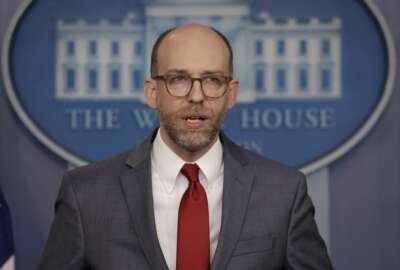Sammies finalist recognized for handling GSA’s presidential transition from Trump to Biden
Mary Gibert is GSA's federal transition coordinator and associate administrator for the Office of Civil Rights.
Best listening experience is on Chrome, Firefox or Safari. Subscribe to Federal Drive’s daily audio interviews on Apple Podcasts or PodcastOne.
Presidential transitions can be tense when the party in power is changing. The car ride with Herbert Hoover and Franklin Roosevelt was famously icy. Toughest in memory, though, may be the last transition: Trump to Biden. Mary Gibert handled it all on behalf of the General Services Administration, and for her aplomb, is a finalist in this year’s Service to America Medals program. She’s GSA’s federal transition coordinator and associate administrator for the Office of Civil Rights, and she spoke more about her work to Federal Drive with Tom Temin.
Interview transcript:
Tom Temin: Ms. Gibert, good to have you on.
Mary Gibert: It’s great to be here. Thank you.
Tom Temin: Let’s begin with what actually GSA does in presidential transitions, because it’s outside of the realm of politics and you just make sure that people have what they need to get the job done basically – correct?
Mary Gibert: Well, in a nutshell, but it’s a little more than that. We actually manage the transition for the federal government. So in addition to providing the space and services during the pre-elect the post-elect and supporting the inauguration, we actually coordinate transition activities for the entire federal government. So one of the key roles is the setting up of the council’s so there is a statute presidential transition act statute that lays out all of this. But one of the things that the statute requires is that there is an agency transition directors council, and that is comprised of all the major organizations and departments department State Department of fence, the big players on that particular council. And that Council is co chaired by myself, and the deputy director of OMB management. And so we chair and provide guidance out to the federal community through that council. We also, although not required by statute, because we want to make sure all government is ready, also hold a separate council for everyone else. We are guided by the White House Transition Coordinating Council, which is chaired by a person designated by the White House and in this case was Mark Meadows, and his deputy Chris Liddell was our primary point of contact.
Tom Temin: Got it. So this White House then, or the former White House, didn’t totally walk away from the whole thing.
Mary Gibert: Oh, no. And I would say the White House Transition Coordinating Council through Chris Liddell was key in how it ran as smooth as it ran, despite all the challenges that we faced. And those members are designated by the White House. And I was the only career member on that council. And my role was to bring the guidance back from the White House to the agency transition directors council.
Tom Temin: And while this is going on, does it become full time for you for a period?
Mary Gibert: Yes. So I would say from May till Inauguration Day, it is full time. Prior to that starting, oh I would say October-December timeframe, 18-to-24 months, it’s part time. And then after inauguration, it’s part time again. But the big bulk of the effort is from May timeframe up to Inauguration Day.
Tom Temin: Sure. And how does this happen to be in the Office of Civil Rights of all places?
Mary Gibert: So that just happens to be where I was working. So the position is designated by the GSA administrator. And the statute requires a senior career official, so a member of the Senior Executive Service, and it can be from anywhere within GSA. And it happened that I was working in the Office of Civil Rights at the time, this particular cycle.
Tom Temin: So basically, for a while you’ve got two hats, as they say,
Mary Gibert: When I was full time, I delegated to my deputy because, as you might imagine, with this one, as well as anyone during the peak period, it is full time.
Tom Temin: We’re speaking with Mary Gilbert, she was Federal Transition Coordinator, and is Associate Administrator for the Office of Civil Rights at the General Services Administration. And in pulling all of this together, and you’re dealing with the incoming team and the outgoing team, and there wasn’t much love lost there – let’s put it that way. What skills of your own Do you feel that you draw on to be able to have this happen in a way that’s good for the government, good for the public, and the politicians will have to take care of themselves?
Mary Gibert: So I think it’s a testament to our democracy and the Presidential Transition Act that my position is apolitical. So it is career, the agency transition directors and every agency our career folks. So having said that, I would say probably one of the most important skills, his political savvy, and also the ability to establish relationships, trust, communicate, because everybody had to trust me, in order for this to work and believe that I was an honest broker. And this all had to be done in an environment a COVID environment, where in past years you would have met in person and in person helps speed up that relationship building. And in many cases, we did not meet each other folks. I worked with every single day, some days, 15-20 hours a day, we did not meet in person. So I would say that those are the skills of managing and balancing.
Tom Temin: And have you had the chance, by the way to go back and meet some of the incoming people in person now that they might have had jobs in the government now as part of the administration?
Mary Gibert: Yes. And we still have a couple of items that we’re working through with them that there is entitlement for so there’s a million dollars in training funds that we’re working with the current administration on. And we also for our own internal, always looking to do better and improve the process is we did an after action review, and we spoke with them all after words.
Tom Temin: And have you had any feedback from the people that were coming in at this point?
Mary Gibert: I think in general, the feedback was good, I would ask them, the Sammies has quotes from them. So I’ll let them speak for themselves on how they felt. In general, I think the thought was, in spite of it went off remarkably well, with all the challenges that we had related to COVID delayed ascertain action, all the things that were happening in the world, and it still went off.
Tom Temin: Yes, it sure did. And this is something I asked a lot of Sammies awardees and just briefly describe your own career, how did you come to this type of work, and you’ve done pretty well being an Associate Administrator?
Mary Gibert: Well, I started my federal career. So I spent most of my career in federal service as a private in the US Army. So I did seven years in the Army. And then I joined the federal service working for Department of Defense IRS, Department of Navy and ended up at GSA. And GSA is a great place to work because I think we provide services to the government, what you need to deliver the mission. So in addition, I started doing leases in the public builder service. And then the highlight, I wanted to highlight, I think of my career in the Public Building Service, I got to be a zone executive during the era, the Recovery Act, so I got to help spend GSA is $5 billion. That was very exciting. And then I ended my time in the public building service as the regional Commissioner for the National Capital Region, which is the largest region 100 million square feet of leased and own space, $3 billion in revenue, 1,200 people, and 1/3 of the PBS inventory. So I’ve had great opportunities to do great things.
Tom Temin: And I imagine that seven years in the Army taught you that when facing some kind of a crisis or seeming crisis or roadblock, you say to yourself, yeah, well we can get through this too.
Mary Gibert: Yeah. And I think that’s kind of you just do it. And when you think back on it, I think that’s when it kind of hits you. But I think I would be remiss if I didn’t mention I didn’t do this by myself. So I had three folks that I heavily relied on that were my leadership team, Dorsy Yoffie, she was my deputy. Liz Kane was the director of pre and post election services. So she was directly involved in and ran that piece of it. And then Kathy Geyser ran the inaugural and the post elect. And then on the federal entity side, the coordination and the core team that worked a federal government, we had OPM. So that was Steve Hickman. We had NARA that was Chris Naylor. We had OGE, Shelby, Finlayson. And then DOJ was Lee Loftus. And then Jim Smith from the intelligence community. So we were kind of the core group, that kind of organized things and a lot of the policies and things came out of So none of this happens by yourself. You got to have great people, great colleagues, great team, and it doesn’t work without it.
Tom Temin: Mary Gibert was the Federal Presidential Transition Coordinator, and now the Associate Administrator for the Office of Civil Rights at the GSA – and a finalist in this year’s Service to America Medals program. Thanks so much for joining me.
Mary Gibert: My pleasure, thank you.
Copyright © 2025 Federal News Network. All rights reserved. This website is not intended for users located within the European Economic Area.
Tom Temin is host of the Federal Drive and has been providing insight on federal technology and management issues for more than 30 years.
Follow @tteminWFED





